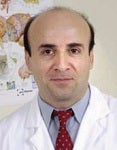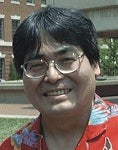Affiliate Faculty
There are a number of affiliate faculty at Georgetown from neighboring institutions. Affiliate Faculty are available as co-mentors or thesis committee members.
James Baraniuk
James Baraniuk
Professor, Medicine
Baraniuk Lab
baraniuj@georgetown.edu
Education: M.D. University of Manitoba, Canada, 1981
Current Research: Our mission is to improve the lives of our patients who suffer from Chronic Fatigue Syndrome, Gulf War Illness, and other idiopathic conditions. We aim to understand the underlying mechanisms that lead to the chronic nature of pain and fatigue through: Non-invasive functional magnetic resonance imaging (fMRI) brain scans, Serial changes in bodily fluids following a physiological stressor, Alterations in autonomic control.
Rachel Barr
Rachel Barr
Professor, Psychology
Georgetown Early Learning Project
rfb5@georgetown.edu
Education: Ph.D. Otago, Psychology, 1999
Current Research: Learning in context. I study the transfer of learning as a function of environmental conditions. I have a line of research examining learning from television, books and touchscreens during infancy and early childhood. I also study how bilingual exposure influences transfer of learning.
Joshua Corbin

Joshua Corbin
Associate Professor, Center for Neuroscience Research
Joshua Corbin Laboratory
Jcorbin@cnmcresearch.org
Education: B.A. Rutgers University; Ph.D. University of North Carolina-Chapel Hill
Current Research: The Corbin lab studies the genetic and cellular basis of the normal and abnormal development of the mammalian amygdala. Despite an extensive understanding of amygdala function and anatomy, currently little is known regarding the development of this complex structure, and how altered development of the amygdala contributes to the phenotypes observed in developmental disorders such as Autism Spectrum Disorders and Fragile X Syndrome. To address these questions, we use the mouse as an experimental model, employing both standard and cutting edge embryological, transgenic, electrophysiological, and optogenetic approaches. The ultimate goal of the studies in our lab is to understand the link between developmental events and the assembly of the mature amygdala at a genetic, cellular, structural, and functional level.
James Giordano

James Giordano
Chief, Neuroethics Studies Program, Pellegrino Center for Clinical Bioethics
Neurobioethics.org
jg353@georgetown.edu
Education: Ph.D. City University of NY, Biopsychology, 1986
Current Research: Studies of neural bases of human ecology and moral decisions and action; studies of ethical issues arising in and from neuroscientific and neurotechnological research and applications in medicine, public life, and national security and defense. Neuroscience of chronic pain, analgesia, and pain care (specifically, the role of serotonin 5-HT3 receptor system in inflammatory pain).
Thomas Mellman
Thomas Mellman
Professor, Psychiatry, Howard University College of Medicine
tmellman@howard.edu
Education: M.D. Case Western Reserve School of Medicine, 1982
Current Research: Much of his research and publications have addressed the role of sleep disturbance in the pathogenesis and treatment of PTSD. His current RO-1 research studies patients who are being treated for traumatic injuries and includes early sleep recordings and longitudinal assessment of PTSD. This work has led to several recent publications of sleep-related and other predictors of the early development of PTSD.
Gholam Motamedi

Gholam Motamedi
Professor, Neurology
motamedi@georgetown.edu
Education: M.D. Tehran University of Medical Sciences, 1987; Internship, Yale, 1994; Residency, Baylor, 1998; Fellowship, Johns Hopkins, 2001
Current Research: In drug-resistant (refractory) epilepsy the alternative option is limited to surgery however, this is not always a viable option. We explore the potential therapeutic effects of novel modalities in particular hypothermia and cortical stimulation for these patients. We study the effects of hypothermia (cooling) in slice models of epilepsy in Dr. Stefano Vicini’s laboratory. We have shown that cooling can terminate epileptiform discharges in these models with no discernible tissue damage. We have explored the cellular mechanisms of action of hypothermia in particular a possible differential effect on interneurons vs. pyramidal cells. We are also studying the role of high frequency oscillations (HFOs) in epilepsy and cognitive processing. We plan to investigate the potential disease modifying (antiepileptogenic) effects of hypothermia with the goal of establishing a Georgetown Center for Advanced Epilepsy Research in collaboration with Drs. in Drs. Jian Yong Wu, Andrei Medvedev, Patrick Forcelli, and outside investigators. We are also exploring the characteristics of seizure onset focus and epileptogenesis as well as the possibility of using cortical stimulation for treatment of insomnia.
John Partridge

John Partridge
Associate Professor, Pharmacology & Physiology
Vicini Lab
jp374@georgetown.edu
Education: B.S. Xavier, 1993; Ph.D. Vanderbilt, 2000
Current Research: My varied research interests include determining the mechanisms and molecules governing synaptic transmission in the central nervous system using electrophysiological, genetic and pharmacological methods. I’m also becoming more orientated towards how the “periphery” can have profound effects on the central nervous system. Questions like “What does blood pressure do to neuronal activity?”, “Does the GI microbiome affect the CNS?” and “What do anti-inflammatory drugs do to the CNS?”
A big part of this change in perspective is because more recently in my career, I have shifted directions to a role in medical and graduate education. I serve as the director of the M.S. Pharmacology program and I am the course director of the Medical Pharmacology course for the medical students. I’m actively involved with Ph.D. student thesis committees and enjoy talking/discussing projects.
Available as a thesis committee member only.
Jana Reifegerste

Jana Reifegerste
Assistant Professor, Neurology
Aging Brain & Cognition (ABC) Lab
jana.reifegerste@georgetown.edu
Education: PhD Max Planck Institute for Psycholinguistics & Radboud University Nijmegen (the Netherlands), 2014
Current Research: Our lab examines how cognition and the brain change across the adult lifespan. Of particular interest is the role of learning and memory in language, and how different developmental trajectories for different memory systems may (or may not) explain the lifespan development of different language abilities, such as lexical and grammatical processing. By examining a broad range of healthy participants as well as individuals with neurodegenerative diseases (e.g., Mild Cognitive Impairment, Parkinson’s disease), we hope to uncover factors that moderate and mediate age-related cognitive and neural changes, such as education, exercise, and genetics.
Raymond Scott Turner

Raymond Scott Turner
Professor, Neurology
Memory Disorders Program
rst36@georgetown.edu
Education: M.D., Ph.D. Emory Univ., 1988
Current Research: Active and passive immunization strategies for transgenic Alzheimer’s disease (AD) mouse models. Molecular mechanisms, therapeutic effects on memory/behavior and on CNS neuropathologies, and neuroinflammatory effects. Role of ApoE genotype on immunotherapies by using hApoE knock-in AD transgenic mice.
Robert P. Yasuda

Robert P. Yasuda
Assistant Professor, Pharmacology & Physiology
yasudar@georgetown.edu
Education: Ph.D. University of Colorado, 1986
Current Research: My laboratory is involved in the study of the structure and function of neuronal nicotinic receptors in the brain that are composed of five protein subunits that act as ligand-gated ion channels. These receptors are thought to be involved in the nicotine addition seen in smokers. We utilize molecular biological, biochemical and electrophysiological methods to study these receptors. Specifically, we are interested in understanding the nature of the nicotine binding site and how the order of these nicotinic receptor subunits affects function. One approach we are currently using is the creation of concatamers of the nicotinic receptor subunits that allow us to make receptors composed of subunits of known order and composition.
Kareem Zaghloul
Kareem Zaghloul
Principal Investigator, Surgical Neurology Branch, National Institute of Neurological Disorders and Stroke, NIH
Functional and Restorative Neurosurgery Section, NIH
kareem.zaghloul@nih.gov
Education: M.D., Ph.D. University of Pennsylvania, 2003
Current Research: Our lab exploits the unique investigative opportunities provided by intracranial recordings during neurosurgical procedures. Using electrodes captured from epilepsy patients implanted with subdural and depth electrodes, we investigate the activation of cortical networks during memory encoding and recall. And using recordings captured during the implantation of deep brain stimulators, we investigate the role of the basal ganglia in learning and decision-making.
